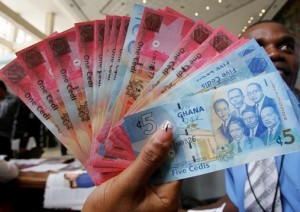Bank of Ghana measures to stop cedi plunge unsuccessful
 The Bank of Ghana financing of the budget deficit is one of the factors that have weakened the capacity of monetary policy and also partly explains the sharp cedi depreciation of recent years, according to Renaissance Capital.
The Bank of Ghana financing of the budget deficit is one of the factors that have weakened the capacity of monetary policy and also partly explains the sharp cedi depreciation of recent years, according to Renaissance Capital.
The $968 million IMF programme is expected to phase out the Bank’s financing of the budget deficit by reducing it to five per cent of the previous year’s revenue in 2015, and zero per cent from the beginning of 2016.
Financial analysts group, like Renaissance Capital attributes the 26 per cent cedi depreciation to a $494 million financing gap in the balance of payments in the first quarter of 2015, which had to be met with foreign exchange reserves.
This gap Renaissance Capital believes was due to an 80 per cent year-on-year fall in the capital and financial account surplus to $55 million, which failed to fully finance the $549 million current account deficit.
Meanwhile, after the central bank dramatically pushed dollars to the interbank market to stabilise the cedi against the dollar, the local currency has continued to slide, raising concerns about the bank’s efforts.
Since the rise of demand for the dollar in the market, the cedi has been weakened. It exchanged at 3.7500 per dollar on Thursday, August 6, 2015.
The strong rally in the cedi from July 1, 2015 was partly due to a surge in dollar sales by the central bank, which helped to clear the excess demand that had caused the currency to depreciate by 26.2 percent in the first half of the year, according to Ronak Gopaldas, Head of Country Risk at South Africa’s Rand Merchant Bank.
He told Ghanabusinessnews that the central bank measures have been partially successful.
“With Ghana being dependent on cocoa, oil and gold — its economic performance will be tied to commodity price movements, which is out of the control of the central bank,” he said.
He explained that what the Ghanaian authorities can control is things like better fiscal management and adhering to the International Monetary Fund’s austerity package to assure investors and market participants.
Ronak believes the new Eurobond will see more hard currency filtering into the system, adding that “this will ease currency pressures to some extent.”
However, he said, a massive currency appreciation is unlikely as market participants are already factoring in these inflows.
By Emmanuel K. Dogbevi & Ray Pollera
